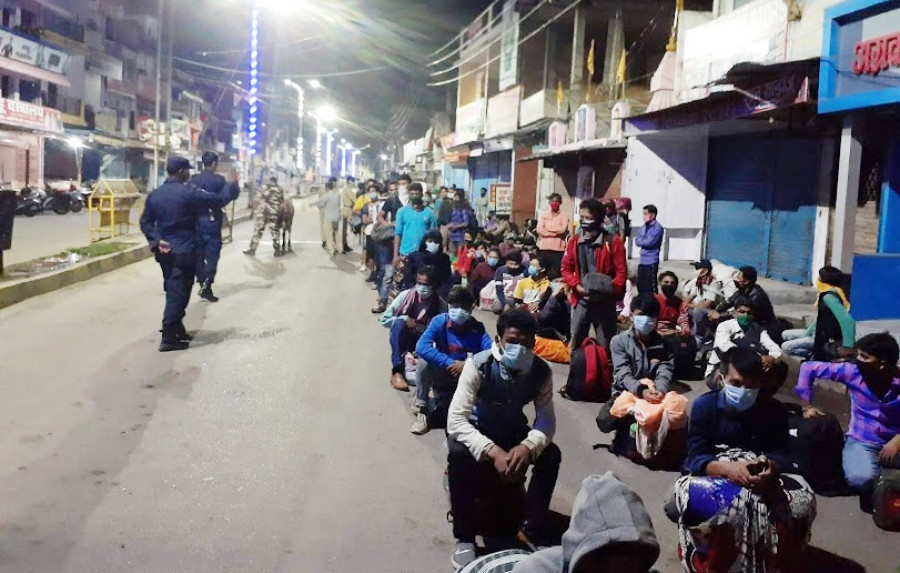National
Supreme Court asks government why Nepalis working in India are not considered to be in ‘foreign employment’
Petitioners say excluding work in India from the foreign employment category is discriminatory towards Nepali workers.
Chandan Kumar Mandal
The Supreme Court has issued a “show-cause” notice to the government asking why Nepalis working in India are not included in the “foreign employment” category, and not treated on a par with other Nepalis working elsewhere.
Responding to a writ petition on Friday, a single bench of justice Prakash Dhungana asked the Prime Minister’s Office and the Council of Ministers why Nepalis working in the southern neighbour were not recognised in the same way as those who go to other countries for employment.
“The Foreign Employment Act, 2007 clearly mentions that irrespective of the country of destination, every citizen going abroad for work is a migrant worker,” said Advocate Nirmal Kumar Upreti, one of the petitioners. “But labour migration to India has never been considered as foreign employment,” said Upreti, who filed the petition on behalf of Forum for Nation Building Nepal along with Dipak Raj Joshi.
The government doesn’t maintain records of citizens who go to work in India. Even unofficial estimates vary widely. According to a Migration in Nepal report, the number of Nepali population in India is said to be between 3 to 4 million.
A majority of Nepalis who work abroad are employed in India as the two countries share an open border. While Nepalis going to work in a third country have to apply for a labour permit from the Nepal government, Nepalis going to work in India do not receive such permits. This provision, the petitioners said, violates their rights.
“Nepali workers in India do not have to take work permits and get insurance before migrating. This deprives them of financial support from the government and other compensation they could get from the Nepal government,” said Upreti. “The government has not maintained records of Nepali workers in India where they must be dying or getting injured too. But they can’t claim anything from the Nepal government.”
According to Upreti, such discriminatory treatment towards Nepalis workers in India violates their constitutional rights to equal treatment.
Nepali migrant workers have received permits to work and live in over 170 countries, mainly in the Persian Gulf and Malaysia. Before going abroad, a worker has to contribute to the Migrant Workers’ Welfare Fund, maintained by the Foreign Employment Board, and buy insurance.
In return, migrant workers’ and their families receive financial assistance from the government in case a worker dies, is injured or contracts life-threatening diseases. The family of a migrant worker receives financial compensation of Rs 700,000 from the government if the worker dies abroad. In addition to that, they also get compensation from insurance companies which can amount up to Rs 1.5million. However, for availing these services, the worker must have contributed to the welfare fund and gone abroad with a labour permit.
“If the government starts issuing them [the people who go to India] labour permit, they will also contribute to the fund, and such workers and their families could benefit from the welfare fund,” said Upreti.
“Migrant workers’ families not only get financial compensation for losses and injuries, but their children also get a scholarship from the board,” said Upreti. “If there is a law, then why they aren’t eligible for the work permit and enjoy all the facilities?”
The petitioners also complained that not including Nepalis working in India under the foreign employment category also deprives them of the government’s reintegration schemes meant for returnees.
“They can’t even receive the soft-loan the government has been providing to returnee migrant workers and other facilities, even though those who work in India are also migrant workers,” said Upreti.
Nepalis have been working in India for at least two centuries. The formal migration to India is supposed to have begun with the recruitment of Nepali Gurkhas by the East India Company in 1815.
In the years to come, more Nepalis were drafted into the British and Indian armies and young Nepali men started going abroad for work. In 1950, Nepal and India signed the Treaty of Peace and Friendship that provided free movement to Nepali and Indian nationals across the borders among other privileges.
Last fiscal year, Nepal received Rs. 128.5 billion of remittance from India, one of the highest from a foreign country
“The Treaty of Sugauli allowed the free movement of people across the countries. However, India is still a foreign country. That’s why going to work in India should also be considered foreign employment,” said Upreti.
“The country is using remittances from India, but do not consider its workers there as migrant workers. The tragedy is that Nepal’s embassy in India does not even have a labour attaché.”




 8.22°C Kathmandu
8.22°C Kathmandu














